Introduction
Even though we're playing in a very democratic format, it has been around three months since the last banlist, and many players were already expecting another update to the list of forbidden and limited cards. Hence, on December 19th 2023, Konami announced a new banlist for Yu-Gi-Oh! TCG.
The new banlist will be legal from January 1st 2024 onward, and promises to affect the game state heavily, once it hit the main meta decks, bringing back to the game cards that are potentially "problematic" and altering mechanics that seemed untouchable in the past.
Check out below all the changes announced to the new Yu-Gi-Oh! TCG format.
Forbidden
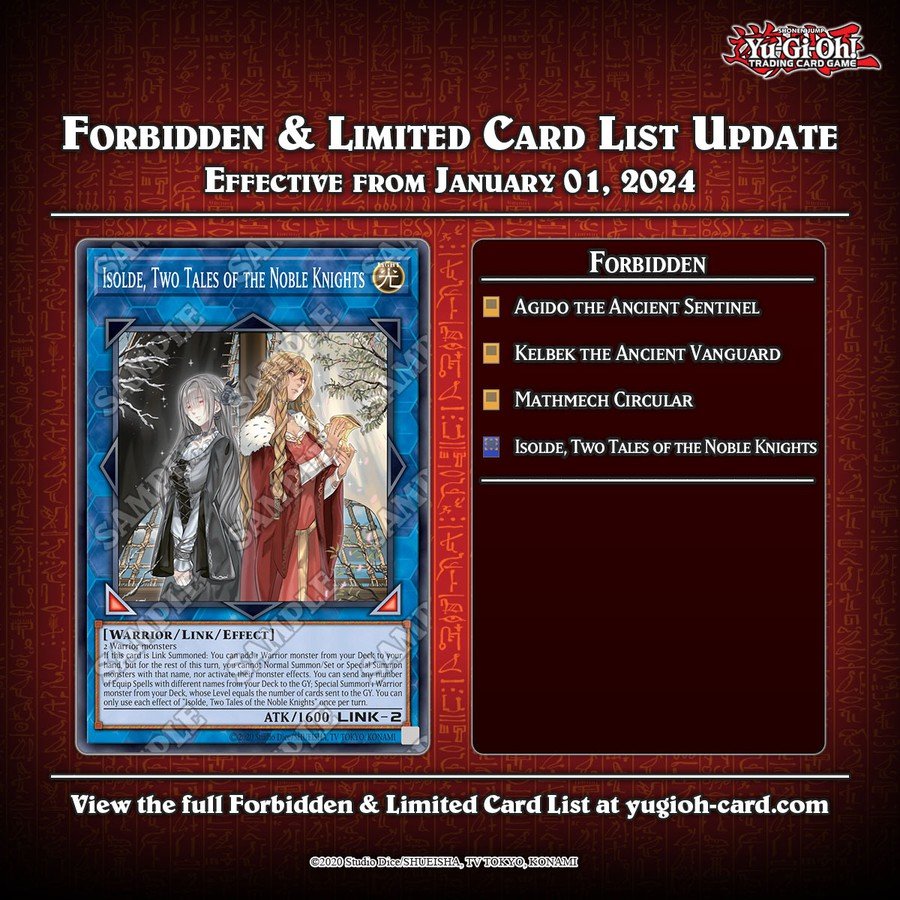

Agido the Ancient Sentinel and Kelbek the Ancient Vanguard were the main cards responsible for Tearlament's ascension to Tier 0 status, and, even though they were limited, after the Kashtira Arise-Heart ban, they are the cards that make games unbalanced and favor Tearlaments.
This duo's ban is quite interesting to the game, once it impacts Tearlaments' consistency and tries to remove it from the metagame without making it completely useless.

Mathmech Circular is a card that brought its archetype to a competitive level, and, even though it has never become a solid main deck in a format, it has always been among the best. As a result, Mathmech Circular was limited a few months ago, and ever since then this deck's popularity and representation in big tournaments plummeted.
Its ban now is a surprise, considering currently this card has no competitive relevance. However, I see this decision as a good one because "Circular" is an extremely generic, absurd card, was used in several cyberse type decks and also in decks focused on class 4 xyz monsters.

For many, the Isolde, Two Tales of the Noble Knights ban was a matter of time ever since it was released, and now this theory is confirmed. Besides being essential to Infernoble Knight's consistency, a deck that was quite present among the best decks currently, "Isolde" was a key piece in FTK combos in this format, and is definitely the best ban in this list.
Limited
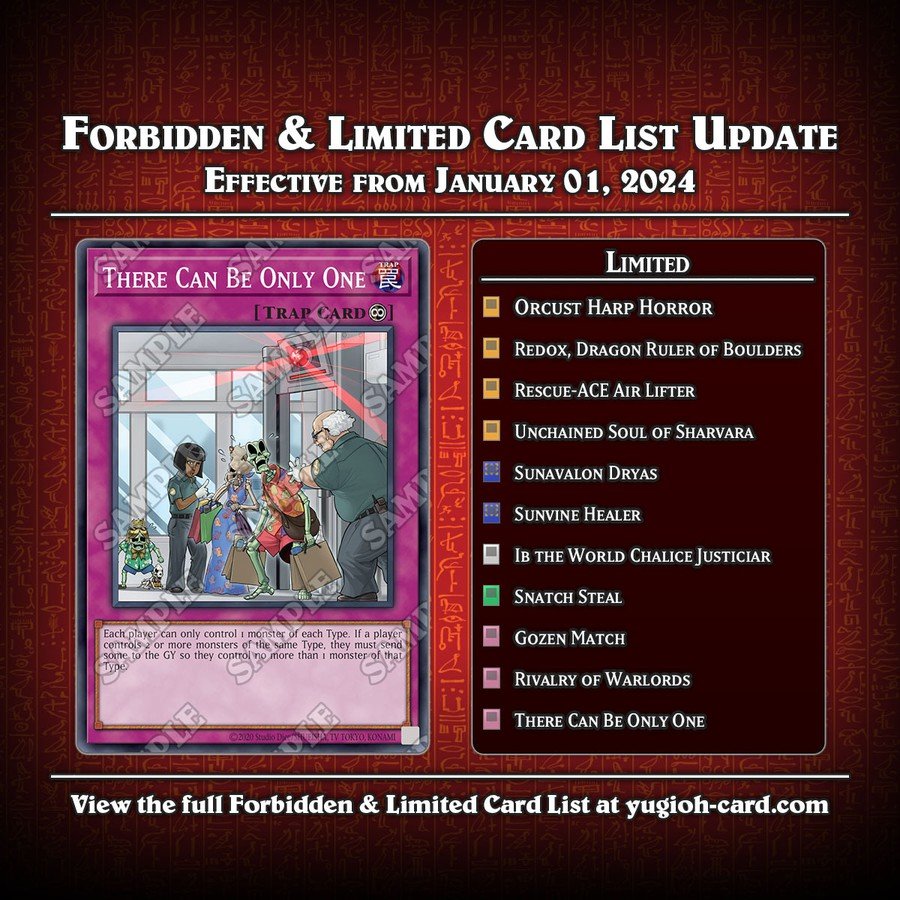

The return of Orcust Harp Horror has been very exciting for fans of this archetype. To tell you the truth, it could have happened a long time ago. Even though this return makes Orcust's strategy more consistent, this deck will probably not be a meta deck because of the years of powercreep it went through.

As expected, another Dragon Ruler is no longer banned, and returns to the game, even though it is limited to 1 copy. This time, Redox, Dragon Ruler of Boulders was the chosen one. This return shouldn't be too relevant, considering the return of this archetype's other partners that came back from the banned list also weren't.

Rescue-ACE Air Lifter is a direct hit to the deck that was most represented in the latest YCS's. I believe this is a very interesting decision because, even though it doesn't remove this deck from the meta, it affects this archetype's only "1 card combo", which makes this deck a bit less efficient.

Unchained Soul of Sharvara's limitation is very impactful for Unchained, which, besides having its number of "starters" reduced, loses a considerable amount of resilience, and will struggle to form a board with the presence of D/D/D Wave High King Caesar. Everything points to Unchained no longer being a meta deck. Instead, it will return to being just another rogue deck in Yu-Gi-Oh! TCG.

We have another double hit, and it once again involves "delayed" restrictions. Rikka Sunavalon is the current champion of the European Continental, and is considered by many an oppressive deck, which needs to be "controlled" by the banlist even though it isn't at the top of the metagame.
The limitation of its two link-1s is an excellent decision, conserving this deck's capacity of building the same board as before, but now being less resistant to interactions.

Ib the World Chalice Justiciar is one of the most controversial cards among the ones that return in this banlist, considering that, historically, it has always been involved in combos that were harmful to the game's health. Despite this, I believe its return won't make it as relevant as before, when it was banned.

Continuing with the controversial cards, we have Snatch Steal, another one of them. This card stands out as it is a card that was banned from the game more than once, and can now go through its third ban. Particularly, even though it is a card that has a strong mechanic, I believe it would only cause problems if the format centers around it, with players focusing their techs on cards that steal enemy monsters.

We've reached the greatest surprise in this banlist. The limitation of the main floodgate trio in the game is something that many players wished for, but no one believed Konami would one day do it. I see these limitations as a step forward for the mindset of the ones responsible for the game because I believe reducing anti-game cards is beneficial to the format and the players.
Semi-Limited
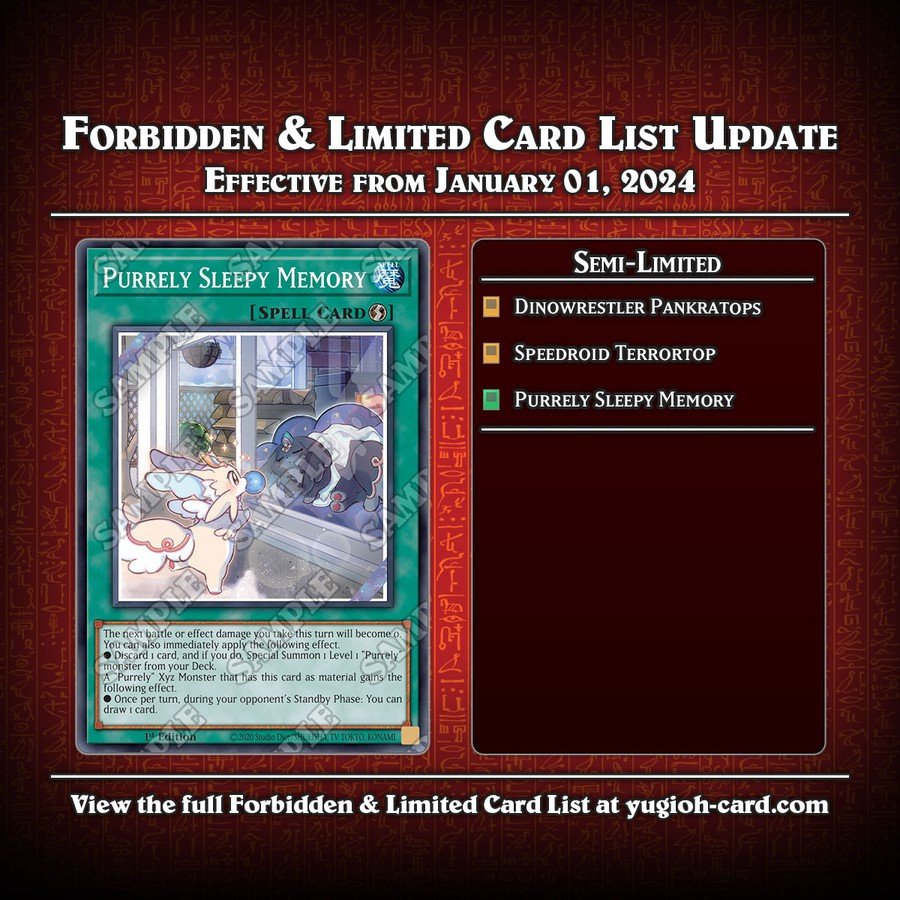

Dinowrestler Pankratops is a return the community has asked for some time now because, in a world in which Kashtira Fenrir is free, it makes no sense to keep "Pankratops" restricted. As a result, I believe this semi-limitation is a test, and it is possible that this card will later on return to complete freedom.

Speedroid Terrortop was limited as it was a generic starter in decks that took advantage of M-X-Saber Invoker's effect. However, considering this card is banned, there is no need to keep Terrortop restricted. Besides this, there are in the game other generic engines that can place two level 3 monsters on the board, and these are also not relevant in the game.

Purrely Sleepy Memory's semi-limitation is a slight hit to Purrely's consistency, as it slightly restricts this deck's access to one of the main cards in this archetype. However, I see this as something minimal, and I believe it won't influence this deck's performance in the new format too heavily.
Unlimited
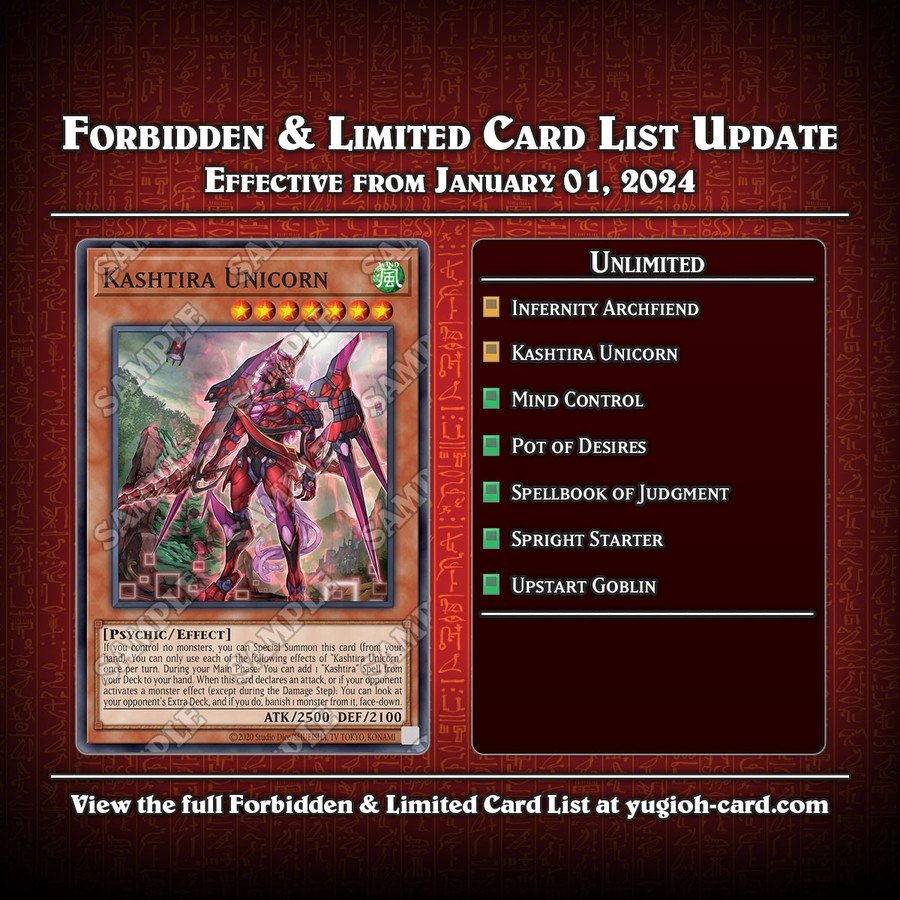

Infernity Archfiend being totally free from the banlist is something that can scare older players. However, I believe that, due to the number of handtraps we use nowadays, this deck won't be as relevant as it once was years ago, considering it isn't very resistant to the main "anti-combo" techs.

Going from 2 to 3 copies doesn't seem like a lot, but the return of Kashtira Unicorn to total freedom is something that can influence the popularity of the Kashtira engine in the most various decks, and can even increase the representation of Kashtira itself as a sort of anti-meta deck in the format. However, to sum up, I don't believe this card will be relevant to the point of requiring a change again.

Mind Control's liberation is as relevant as Snatch Steal, once they basically have the same effect. However, in practice, it is a less prejudicial card because it has more restrictions.

Another move that many asked for and no one thought Konami would do is freeing Pot of Desires, which, even thought it was considered by many a bad card because of its cost of banning 10 cards, is, actually, an excellent consistency card. However, it is balanced, due to its high cost.

There was a lot of debate when Spellbook of Judgment was freed to 1 copy, but the expectations weren't met and this card had no relevance competitively. Like so, its complete freedom is just another way of reducing the banlist by removing from it cards that no longer influence the current metagame.

As stated before, changing one card from 2 copies allowed to 3 isn't all that relevant, but considering the return of Spright Starter to 3 copies and how the main decks in the format were weakened, it might just be enough for players to once again look at this deck, giving it a new opportunity to shine.

In the past, Upstart Goblin was essential for most decks to be consistent, and each copy of it in a deck was considered one card less; which means, decks with a trio of "Upstarts" used 37 cards following this logic. This happened because it was a card that wasn't worth a negate, and, consequently, the opponent would always let it resolve. This allowed its controller to swap it for another card, like so lowering the number of cards in your deck.
However, even though Upstart Goblin still has the advantage of accelerating your deck when you go first right now, drawing copies of "Upstart" instead of tech cards when playing second might be a crucial factor that will make you lose. Besides, Droll & Lock Bird's popularity is another factor that really impacts this card's efficiency.
Like so, I believe it will only be used in very specific decks, and will very likely not be as relevant competitively.
General Opinion of the Banlist
Yu-Gi-Oh! TCG's metagame was open and somewhat balanced, except for a few unfair interactions that surrounded the format. The expectations for this banlist was for it to restrict power cards, such as Pot of Prosperity, Kashtira Fenrir and also cards that enable FTK's. However, these desires weren't completely met, and the banlist released more cards than it restricted.
The 3 main decks in the format got a few targeted restrictions. Unchained and Tearlaments should go down and become rogue decks, whereas Rescue-Ace, even though it is weakened, will very likely remain a tier 1 deck. Another interesting factor that directly affects the metagame is the Isolde, Two Tales of the Noble Knights ban, and, because of this ban, Infernoble Knight is another deck that is part of the metagame and will very likely not be as efficient as before.
I believe the main decks at the beginning of the next format will be Rescue-Ace and Labrynth. Besides this, I also see potential in decks such as Centur-Ion, Fire King, Purrely and Spright.
Like so, I consider this a good banlist because, even though it doesn't resolve all the problems in the game, it applied good restrictions on decks that were being heavily represented in the last few months, and it dealt with problematic cards, even though a bit late. I'll highlight the floodgates limitation, which was something that not even the most optimistic player expected right now.
Besides this, several cards that no longer needed to be restricted were freed to 3 copies, something I consider excellent to "shrink" the banlist, keeping in it only the cards that impact the game negatively at the current time.
Final Words
But what about you, what did you think of the banlist? Did you miss any cards? Leave your opinion in the comment section.
To get further information about the Yu-Gi-Oh! TCG world, keep browsing our articles. Cards Realm thanks you for your support!

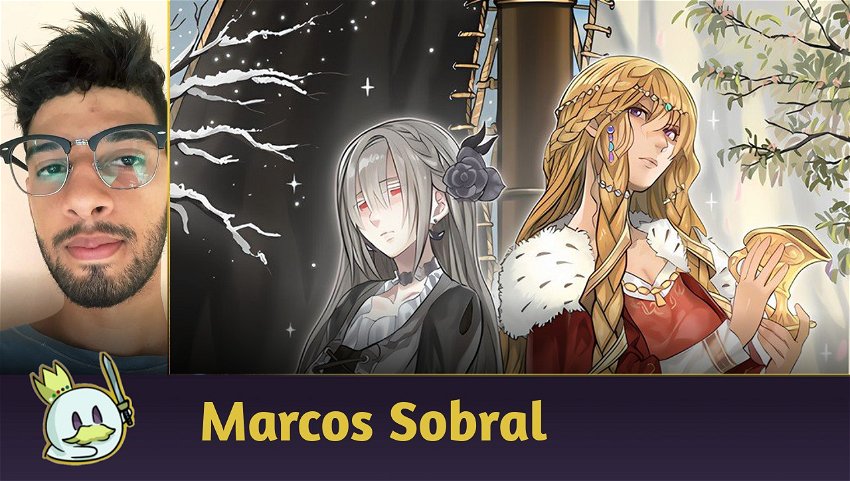







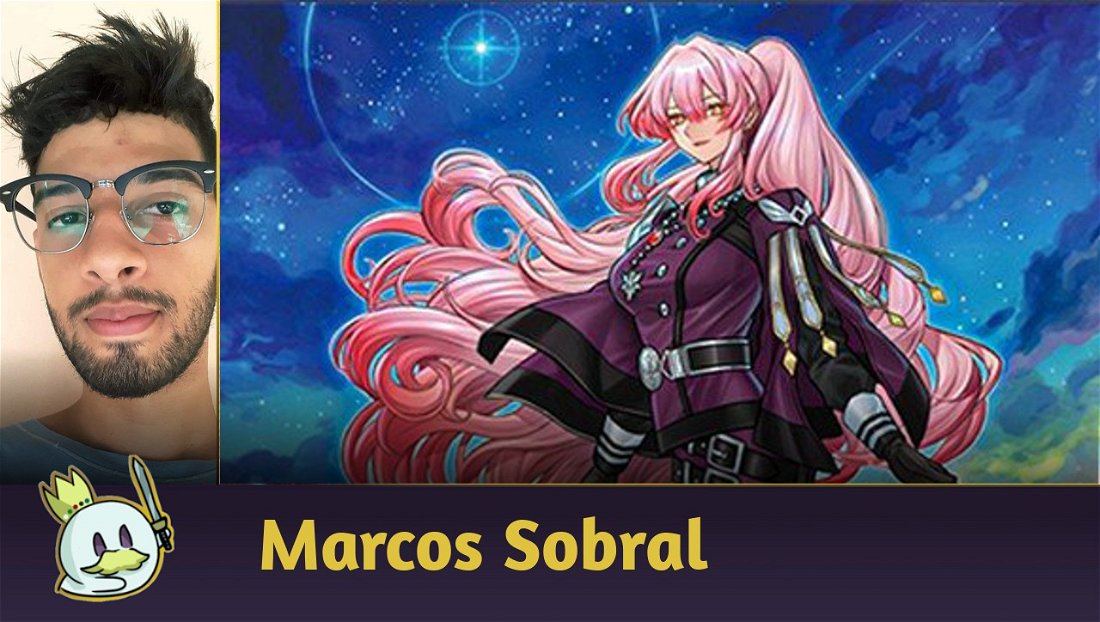
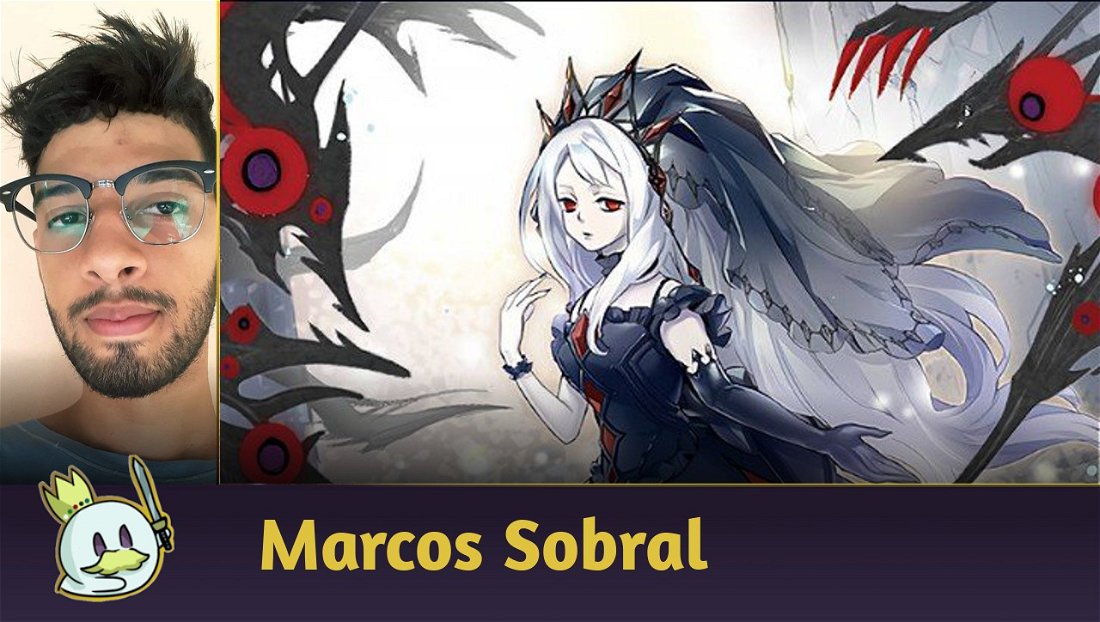



— 评论 0
, 反应 1
成为第一个发表评论的人